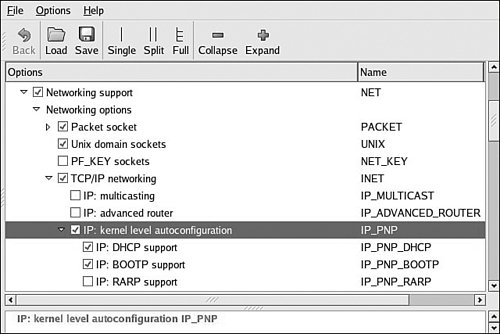Книга: Embedded Linux Primer: A Practical, Real-World Approach
12.3.4. Target NFS Root Mount
12.3.4. Target NFS Root Mount
Mounting your target via NFS root mount is not difficult, and, as mentioned elsewhere, it is a very useful development configuration. However, a set of details must be correct before it will work. The steps required are as follows:
1. Configure your NFS server and export a proper target file system for your architecture.
2. Configure your target kernel with NFS client services and root file system on NFS.
3. Enable kernel-level autoconfiguration of your target's Ethernet interface.
4. Provide your target Ethernet IP configuration via the kernel command line or static kernel configuration option.
5. Provide a kernel command line enabled for NFS.
We presented the kernel configuration in Figure 12-2 when we explained the NFS server configuration. You must make sure that your target kernel configuration has NFS client services enabled, and, in particular, you must enable the option for Root file system on NFS. Specifically, make sure that your kernel has CONFIG_NFS_FS=y and CONFIG_ROOT_NFS=y. Obviously, you cannot configure NFS as loadable modules if you intend to boot NFS root mount.
Kernel-level autoconfiguration is a TCP/IP configuration option found under the Networking tab in the kernel configuration utility. Enable CONFIG_IP_PNP on your target kernel. When selected, you are presented with several options for automatic configuration. Select either BOOTP or DHCP, as described earlier. Figure 12-3 illustrates the kernel configuration for kernel-level autoconfiguration.
Figure 12-3. Kernel-level autoconfiguration

When your server and target kernel are configured, you need to provide your target Ethernet configuration via one of the methods described earlier. If your bootloader supports a kernel command line, that is the easiest method. Here is what a kernel command line might look like to support NFS root mount:
console=ttyS0,115200 root=/dev/nfs rw ip=dhcp
nfsroot=192.168.1.9:/home/chris/sandbox/pdna-target




